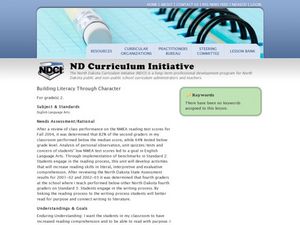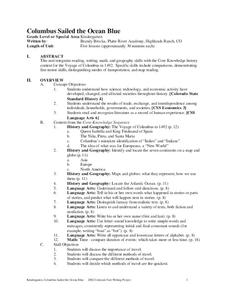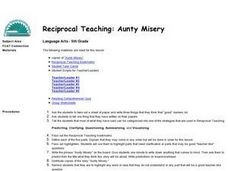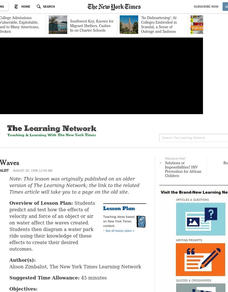Curated OER
Annie's Gifts: comprehension skills
In this comprehension skills worksheet, students read the book Annie's Gifts and complete comprehension activities. Students complete 5 activities including problem/solution, setting, making predictions, making inferences, and...
Curated OER
Using Extrapolations
In this using extrapolations worksheet, 6th graders use data analysis to answer nine questions about data prediction and extrapolation.
Curated OER
Building Literacy Through Character
Second graders connect reading to writing by making predictions, completing text to world connections, solving problems, and more. In this reading and writing lesson plan, 2nd graders draw conclusions after reading and write them down.
Pennsylvania Department of Education
What Comes Next?
Students listen to various books that contain a sidebar of illustrations and practice making predictions about events in each story. In this what comes next instructional activity, students differentiate fact from opinion across...
Curated OER
Sink or Float
First graders explore items that sink or float. They cut and glue pictures of objects that they predict will sink or float. Students place thir pictures on a picture of a bucket of water. Students then color the objects that they had...
Curated OER
You Can't Judge a Book by Its Cover
In this prediction instructional activity, 4th graders answer questions telling what they think the book Tarzan will be about based on the first sentence of the book. Students use that sentence to write a short story of their own.
Curated OER
Weaving Weather Maps with the World Wide Web
Learners access the Internet and use real time data from the American Meteorological Society to create a detailed weather map. They make weather predictions based on the data collected.
Curated OER
Do You Feel Lucky?
Students calculate simple probabilities using mathematics then roll dice to test their predictions.
Curated OER
Night of the Twister
Pupils use reading strategies for Night of the Twister. In this reading strategies instructional activity, students name five major catastrophes and books about each. Pupils complete a vocabulary section, make inferences and predictions,...
Curated OER
Everybody Wears Braids
Students use picture clues, patterned sentences, number words and gain knowledge of what sentences that end with a question mark look like after reading, "Everybody Wears Braids." They connect the title to their lives and make a...
Curated OER
The Adventures of Tom Sawyer: Anticipation Guide
Start off your study of The Adventures of Tom Sawyer with a lesson spent exploring some of the concepts that will be present in the novel. This anticipation guide focuses on honesty and lying. After learners decided if they agree or...
Core Knowledge Foundation
Columbus Sailed the Ocean Blue
Young adventurers embark on a journey, setting sail along the blue ocean with Christopher Columbus. Teachers will find that this unit makes their lesson planning smooth sailing!
Curated OER
Muggie Maggie
Students read a chapter in a book. For this reading comprehension lesson, students predict what will happen in chapter 2 of Muggie Maggie by Beverly Cleary. Students write, define and illustrate new vocabulary words and then...
Curated OER
If You Give a Mouse a Cookie
Students identify the cause and effect in the book If You Give a Mouse a Cookie. For this cause and effect lesson, students listen to the story If You Give a Mouse a Cookie and discuss what the cause and effect is. As a follow-up,...
Curated OER
It Started as an Egg
Learners investigate animals that hatch from eggs. In this hatching animals lesson plan, students investigate which animals are born alive and which hatch from eggs. Learners read It Started As An Egg and practice reading comprehension...
Curated OER
Determine the Main Idea
Students identify the main idea of a reading passage. For this identifying the main idea lesson, students read short passages, highlight or underline important information and record the main idea of the passage. They participate in a...
Curated OER
You Can't Judge a Book By Its Cover, But Can You Judge a Book By Its First Line? #2
In this literature/book analysis worksheet, students read one sentence which is the beginning of a book. Students then answer 6 questions based on this one sentence, predicting what it will be about and other story elements. They then...
Curated OER
Muggie Maggie- Lesson 1
Students predict and read a chapter in a book. In this vocabulary and comprehension lesson, students learn new vocabulary words, make predictions of the story and then read and discuss chapter one of Muggie Maggie. Students...
Curated OER
Reciprocal Teaching: Aunty Misery
Fifth graders investigate the qualities of a good reader by participating in a role play with the provided scripts. They focus on the five main strategies of good readers -- predicting, clarifying, questioning, summarizing, and...
Curated OER
Around the Town
Students explore reading maps. In this map reading lesson, students compare distances fom place to place. Students work in groups and predict the distance then find the actual distance using string or rulers.
Curated OER
Donkey's Ears
In this reading for understanding worksheet, students read the passage, "Donkey's Ears", and choose the best comprehension and prediction answers. Students choose four multiple choice answers.
Curated OER
Who Took the Cookies
Students find the missing cookies. In this language arts instructional activity, students solve the mystery of who is taking the cookies from the cookie jar. Students are read several books with the same mystery of cookies being taken...
Curated OER
Wilson Stands Alone in His Plan for World Peace
Students study the Fourteen Points. They examine motives behind Wilson's Fourteen Points and why most of them were rejected by France. They answers questions concerning primary resources (casualty list and before and after...
Curated OER
Making Waves
Students predict and test how the effects of velocity and force of an object or air on water affect the waves created. They diagram a water park ride using their knowledge of these effects to create their desired outcomes.

























